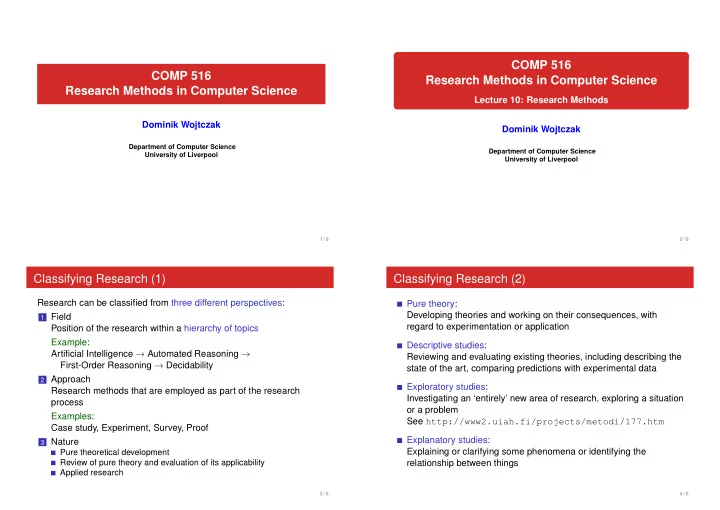

COMP 516 COMP 516 Research Methods in Computer Science Research Methods in Computer Science Lecture 10: Research Methods Dominik Wojtczak Dominik Wojtczak Department of Computer Science Department of Computer Science University of Liverpool University of Liverpool 1 / 9 2 / 9 Classifying Research (1) Classifying Research (2) Research can be classified from three different perspectives: Pure theory: Developing theories and working on their consequences, with 1 Field regard to experimentation or application Position of the research within a hierarchy of topics Example: Descriptive studies: Artificial Intelligence → Automated Reasoning → Reviewing and evaluating existing theories, including describing the First-Order Reasoning → Decidability state of the art, comparing predictions with experimental data 2 Approach Exploratory studies: Research methods that are employed as part of the research Investigating an ‘entirely’ new area of research, exploring a situation process or a problem Examples: See http://www2.uiah.fi/projects/metodi/177.htm Case study, Experiment, Survey, Proof Explanatory studies: 3 Nature Explaining or clarifying some phenomena or identifying the Pure theoretical development Review of pure theory and evaluation of its applicability relationship between things Applied research 3 / 9 4 / 9
Classifying Research (2) Quantitative and Qualitative Research Methods Causal studies: Quantitative research methods Assessing the causal relationship between things Methods associated with measurements (on numeric scales) Normative studies: Stemming from natural sciences Producing a theory of design (or of other development) like recommendations, rules, standards, algorithms, advices or other Used to test hypotheses or create observations for inductive reasoning tools for improving the object of study Accuracy and repeatability of vital importance Problem-solving studies: Resolving a problem with a novel solution and/or improving Qualitative research methods something in one way or another Methods involving case studies and surveys Development and Application studies: Developing or constructing something novel Stemming from social sciences Concerned with increasing understanding of an area Repeatability usually a problem 5 / 9 6 / 9 Research Methods (1) Research Methods (2) Action research: Survey: Pursues action (or change) and understanding at the same time Usually undertaken using questionnaires or interviews Questionnaire and interview design important! Continuously alternates between action and critical reflection, while (See Dawson 2005 for details) refining methods, data and interpretation in the light of the Determination of sample size and sample elements important! understanding developed in the earlier cycles (See specialist literature for details) Example: Reflective teaching Example: Survey on popularity or use of programming languages Case study: Experiment: In-depth exploration of a single situation Investigation of causal relationships using tests controlled by the Usually generates a large amount of (subjective) data researcher Usually performed in development, evaluation and problem solving Should not merely report the data obtained or behaviour observed but projects attempt to generalise from the specific details of the situation observed Example: Evaluation of processor performance Example: Case study of open source software development 7 / 9 8 / 9
Key Elements of an Experiment A precise hypothesis that the experiment will confirm or refute A completely specified experimental system, which will be modified in some systematic way to elicit the effects predicted by the hypothesis Quantitative measurement of the results of modifying the experimental system Use of controls to ensure that the experiment really tests the hypothesis Analysis of the measured data to determine whether they are consistent with the hypothesis Report of procedures and results so that others can replicate the experiment 9 / 9
Recommend
More recommend